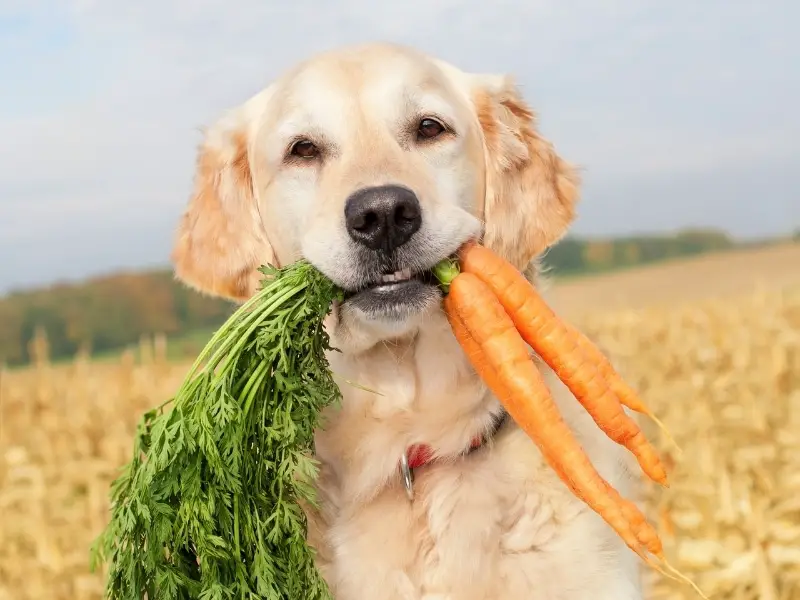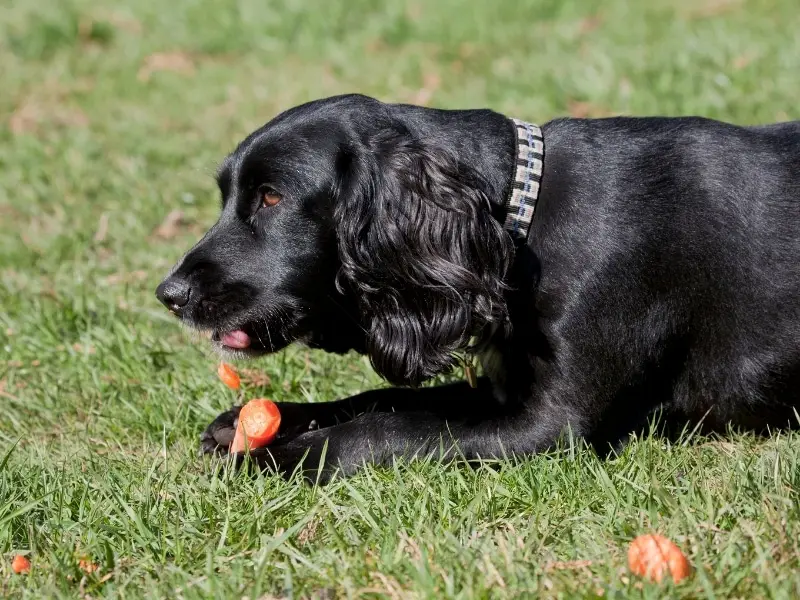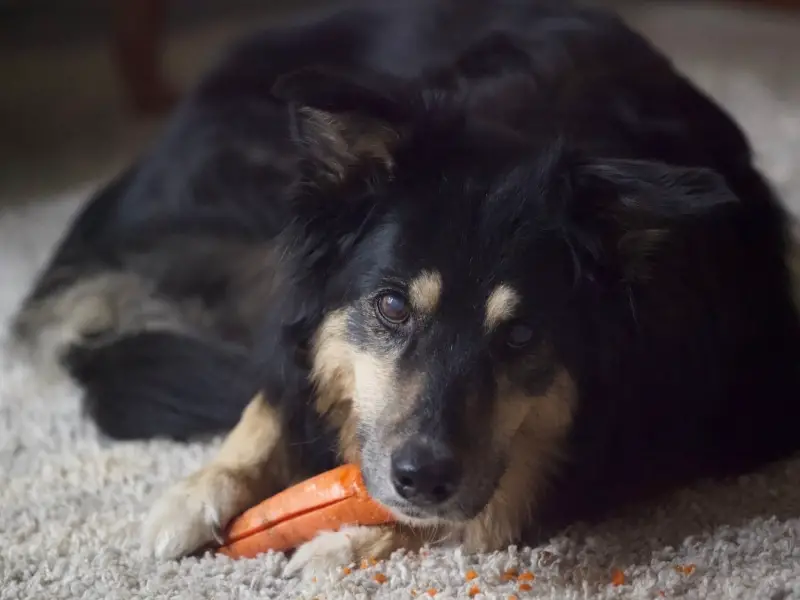Crunchy and brightly orange carrots have many health benefits for people, but are carrots safe for dogs? As a dog parent, you know that there are certain vegetables dogs can eat, and some that are best avoided.
So, can dogs eat carrots? Yes, dogs can eat carrots as treats. Carrots are a good source of vitamins that can improve your dog’s overall health. This orange veggie is low in fat and calories, but high in fiber which supports healthy digestion. Carrots are a healthy and natural snack and most dogs love the taste.
In this article, we’ll tell you why carrots are good for dogs, how much carrots can your dog eat, and much more.
Are Carrots Good for Dogs?
Nutritious and tasty, the carrot is a healthy vegetable that is completely safe for dogs to eat as a treat.
Carrots contain essential vitamins and minerals like vitamin C, K, B6, potassium, and magnesium that are beneficial for your dog’s health. They also contain beta carotene, an important antioxidant, that converts into vitamin A (source).
Since carrots are low in calories and fat, you can use them as a healthier alternative for commercial dog treats. This orange veggie is also a great source of dietary fiber and supports proper digestion.
Benefits of Carrots for Dogs

Including carrots in your dog’s diet can have benefits for their overall health. Let’s see what are the biggest benefits of feeding carrots to your dog:
1. Carrots Improve Eyesight
Carrots are rich in beta carotene which is a provitamin carotenoid that gives them their bright orange color. Beta carotene helps reduce the stress sunlight puts on your dog’s eyes.
Letting your dog eat carrots can improve and sharpen their ability to see in darkness. Beta carotene is also a precursor of vitamin A, an essential vitamin that offers many benefits to your dog.
2. Carrots Support a Strong Immune System
Carrots are naturally rich in vitamin A which has many functions. Besides supporting your dog’s eye health, vitamin A is also necessary for growth, development, and a strong immune system.
Bear in mind, vitamin A is a fat-soluble vitamin that can build up in your dog’s body and cause toxicity (source).
3. Carrots Support Proper Digestion
Carrots are high in fiber, which is essential for proper digestion and can help regulate your dog’s bowel movement. If your dog has loose stool or constipation, a small amount of cooked carrots can support proper digestion and encourage normal bowel movements.
4. Carrots Are a Low-calorie Treat
If your pooch needs to lose weight, a baby carrot can be a great alternative for commercial dog treats. Besides being low in calories, carrots are also low in fat and are a healthy snack that will keep your dog’s tummy full between mealtimes.
Side Effect of Carrots for Dogs

While carrots offer numerous health benefits, feeding them to your dog isn’t completely risk-free. In small amounts, carrots are perfectly safe, however, eating too much can create certain health problems in dogs.
The most common downsides of eating carrots are:
1. Choking Hazard
Due to their firm and crunchy texture, raw carrots are a potential choking hazard, especially for small dogs. To prevent choking and intestinal blockage, cut up carrots into bite-size pieces or cook them before offering them to your dog.
2. Carrots May Cause Gas
Carrots are high in fiber, which when consumed in large amounts can cause gas and tummy ache. To prevent these issues from occurring, feed carrots to your dog slowly and don’t allow your dog to eat too much in one serving.
Can Carrots Give Dogs Diarrhea?
Like all other high fiber foods, large amounts of carrots can give dogs diarrhea. To prevent runny and smelly stools, slowly start to feed your dog carrots so they can get used to the higher fiber count.
How Many Carrots Can a Dog Have a Day?
If your dog loves carrots, this veggie can be a healthy occasional treat. Please note, treats shouldn’t make more than 10% of your dog’s daily calorie intake, so keep this in mind when feeding carrots to your dog.
Generally speaking, a medium-sized dog can safely eat two to three baby carrots a day. If you have a tiny Chihuahua, one carrot will suffice, but a giant like a Great Dane can munch five baby carrots a day.
How to Feed Your Dog Carrots?
Dogs can eat raw, frozen, or cooked carrots as long as they are prepared without any seasoning or oils (source). But before serving them to your dog, make sure that the carrots are thoroughly washed and peeled to remove any dirt and pesticides.
Popular ways to feed carrots to dogs include:
- Grate or shred raw carrots and mix them with dog foods
- Boil and mash carrots into a tasty puree
- Cut raw carrot into sticks and feed as a treat
- Use a juicer to make a refreshing carrot juice
- Offer whole frozen carrots to alleviate teething discomfort in puppies
- Cut up and steam carrots and feed them as treats
Conclusion
Tasty and nutritious carrots are a healthy snack for dogs of all ages and can offer many health benefits. Full of vitamins and minerals, but low in fat and calories, carrots can be a great treat if your dog is on a diet and has to lose weight.
When fed in moderate amounts, carrots support proper digestion, improve eyesight, and can even clean your dog’s teeth.
Don’t forget, eating too many carrots can cause diarrhea, gas, and an upset stomach in dogs, so don’t overdo it. And make sure that your dog eats only bite-size pieces of carrots to minimize the risk of choking.
Related Articles:


0 Comments